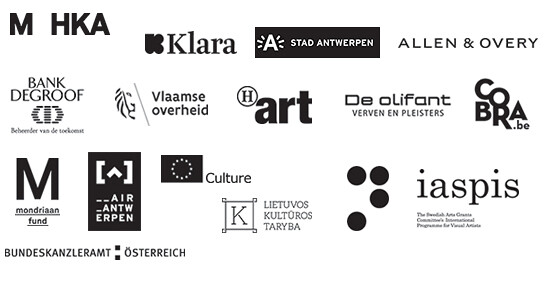May 28–September 27, 2015
Cinema Zuid, Waalsekaai 47, 2000 Antwerp
Leuvenstraat 32
2000 Antwerp
Belgium
Hours: Tuesday–Sunday 11am–6pm
T +32 3 260 99 99
info@muhka.be
Artists: Francisco Camacho Herrera, Josef Dabernig, Kajsa Dahlberg, Róza El-Hassan, Donna Kukama, Artūras Raila, Anne-Mie Van Kerckhoven, Stephen Willats
Materials from four Flemish Archives: ADVN–Archive and Research Centre, Antwerp; Amsab–Institute of Social History, Ghent; KADOC–Documentation and Research Centre for Religion, Culture and Society, Leuven; Liberal Archives, Ghent
Curator: Anders Kreuger
We have made this exhibition because we believe in the possibility of reading politics through culture and vice versa. A society cannot be understood without its culture in general and its visual culture in particular.
In the words of the late social scientist and politician Herman Deleeck, “the welfare state is not merely a social system or an institution, but just as much an ethics.” Indeed, one of the fundamental achievements of the welfare state is to regard the ability to acquire knowledge and culture as a social right of all citizens.
The welfare state is not a thing of the past: its future is now fiercely debated, and many of its key features are being put in place by countries such as China or Indonesia. The exhibition is not nostalgic about the welfare state in its “classical” version. Instead it examines some fundamental contradictions and inconsistencies of this sprawling conglomerate of interconnected institutions, which may be called the greatest monument to democracy and peaceful pragmatic politics.
Yet the rise of the post-War welfare state was entangled with political realities such as the centralised power vertical, the Cold War, colonialism and decolonisation, isolationism and xenophobia or the depletion of the natural environment through relentless industrialisation. The Western welfare state is at least partly a bureaucratic, anti-revolutionary project launched by the nineteenth-century establishment. To this day it operates with regulations that must be applied to everyone in the same way. While it protects individual rights and freedoms, the welfare state demands something in return: individuals must identify themselves as members of society first and foremost.
We discussed these “research questions” for the exhibition with representatives of the four Flemish cultural archives, who helped us select political posters, photographs and films from their collections: Kris De Beule (Researcher, the Liberal Archives), Koen De Scheemaeker (Director, ADVN), Hendrik Ollevier (Head of Collection, Amsab), Paule Verbruggen (Head of Mediation, Amsab) and Luc Vints (Head of Mediation and Communication, KADOC).
We continued to discuss with Professor Ive Marx of the Herman Deleeck Centre for Social Policy Research at the University of Antwerp, with which we are organising a series of seminars that bring together researchers and the artists in the exhibition. In addition, we are organising seminars in collaboration with VAI–Flemish Architecture Institute, Antwerp, and Flemish–Dutch House deBuren, Brussels.
Not least importantly, we also shared our critical remarks on the welfare state with the eight contemporary artists of different generations who participate in the exhibition.
Stephen Willats (England, 1943) shows a generous selection of his works from the last 40 years. We are particularly happy to offer our audience the possibility to use Meta Filer (1973–75). The work allows two participants to create a “model society” in real time, through a vintage computer, by negotiating their responses to a series of slides of people in various social situations.
Anne-Mie Van Kerckhoven (Belgium, 1951) has put together a freeform ensemble of new and existing work—a small solo manifestation within the group exhibition—that relates to the welfare state as a both internal and societal reality. Josef Dabernig (Austria, 1956) has designed purpose-built screening rooms for two of his films, on fitness and holidaying. Artūras Raila (Lithuania, 1962) shows an updated version of Under the Flag (1999–2000/2015), which records the spontaneous response of Lithuanian right-wing activists to his video footage from Austria, and a synopsis for a new opera libretto illustrated by animated pencil drawings. Róza El-Hassan (Hungary/Syria, 1966) proposes a traditional and ecologically sustainable form of emergency housing for those displaced by the war in Syria.
Kajsa Dahlberg (Sweden, 1973) has made Reach, Grasp, Move, Position, Apply Force (2014–15), a self-reflective film about labour that incorporates the precarious conditions of all those who helped her make the film. Francisco Camacho Herrera (Colombia/The Netherlands, 1979) is developing fulltopia.com, a virtual community and website for people who wish to bypass the monetary economy. Donna Kukama (South Africa, 1981) shows The Monument of Apologies (2015), a new video work based on a performance in public space.
“(Re)enacting the Welfare State,” a one-day forum on 30 May, is organised in collaboration with Contemporary Art Heritage Flanders (CAHF), Ghent. It features live (re)enactments, screenings and talks by Kajsa Dahlberg, Donna Kukama, Artūras Raila and the Brussels-based Swiss artist and performer Christophe Meierhans.
“The Welfare State” is organised within the framework of “The Uses of Art,” a project by L’Internationale, a European museum confederation comprised of Moderna Galerija (MG, Ljubljana), Museo Nacional Centro de Arte Reina Sofía (MNCARS, Madrid), Museu d’Art Contemporani de Barcelona (MACBA), Museum of Contemporary Art Antwerp (M HKA), SALT (Istanbul and Ankara) and Van Abbemuseum (VAM, Eindhoven). The confederation and the exhibition are supported by the Culture Programme of the European Union.
We are grateful for this, and for the equally invaluable support received from the Lithuanian Cultural Council and Contemporary Art Centre (CAC), Vilnius; the Mondriaan Fund, Amsterdam; IASPIS, Stockholm; the Federal Chancellery of Austria, Vienna; AIR Antwerpen, Antwerp, and Contemporary Art Heritage Flanders (CAHF), Ghent.
M HKA is an initiative of the Flemish Community and is supported by the City of Antwerp, Klara, Cobra.be, H ART, Bank Degroof, De Olifant and Allen & Overy.

